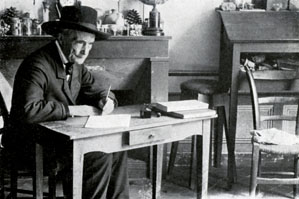A ‘lost tribe’ of writers

If asked to describe your house, what sorts of details would you include? I think I’d talk about the pink walls in my kitchen, the green tiles of my fireplace, the high ceilings, and the big windows.
In a lecture hosted by the College of Social Sciences and Humanities on Tuesday, Massey University associate professor Lisa Emerson spoke of a mathematician who, when he was a kid, wrote his house-description completely in numbers. It had x windows, x doors, x floors. He could have written anything, he reflected, but some internal compulsion focused him on the quantitative facts. “I had imagination in math, just not in words,” he explained.
For many students, math and science are the scary subjects. Everything is black and white, so you always have a 50 percent chance of getting the answer wrong. There’s no wiggle room, no “hand-waving,” as my chemistry professor liked to call it. But it turns out that for many scientists and mathematicians, it’s writing that’s scary.
Every number, every symbol holds inside of it a world of history, context, and implication, one scientist told Emerson. No amount of words could ever fully describe the truth contained in “1”, “=”, or “π,” he explained and thus words are limiting for him.
Emerson is a writer but she’s interested in scientists. Through her talk, she convinced me that there are two kinds of writers in the world: those who write about science and those who write about everything else. The latter group, Emerson said, enjoys a robust community that talks to itself about itself and about its process. But the former, the science writers, and more specifically the scientific writers, do not have that same privilege. She called them “the forgotten tribe” of academic writers.
“There are too many conversations about scientists being poor writers in need of remediation,” she said. But in the two-plus decades Emerson has worked with scientists, she’s found the complete opposite to be true. “They do care deeply about writing,” she said. And as such, she wanted to set the record straight, to bridge the gap between how scientists are portrayed as writers and how they actually experience the process of writing.
She began by asking how they develop their voice, what beliefs they hold about writing, and how they feel about being writers.
So far she has catalogued the writing perceptions, beliefs, and feelings of 130 mathematicians and scientists, including 55 senior researchers, creating “literacy narratives” for each one. The narrative is the revised transcription of her interviews with these scholars, which cross a range of disciplines, institutions, and countries.
She originally went into the study with a hypothesis that scientists follow a “lifecycle model” of writing, she said. In the first stage, people learn to write. This takes place between elementary school and the end of college. After that, they learn to write about science, a process that can last until the end of a post-doctoral appointment. Next, they become leaders through their writing, offering broader perspectives to an audience of peers. Finally, they become end-of-career writers, further broadening their scope both in terms of impact and audience.
Of all the scientists and mathemeticians she interviewed, most said this was a lovely hypothesis and that it made a lot of sense…just not for them. Additionally, they told her, such a model skews the public perception of what a scientist is, by holding that only old scientists can have an impact on the community. “But science is not an old person’s game,” Emerson realized. And if we really want young people to take science seriously, they have to know that.
Through her research, which is ongoing (she hopes more scientists and mathematicians will talk with her about the process of writing), she has learned a few things so far:
- Most of the scientists she interviewed did develop within a community of individuals that are writing, but that community is not talking about writing. They’re talking about science!
- The most significant influences on these scientific writers was not that community, but rather a single individual like a mentor or teacher.
- The two most sustained methods that the scientists she interviewed used to develop themselves as writers were imitation and practice.
There were a few Northeastern scientists in the audience who spoke up about their process, and Emerson was delighted.
So, dear scientist readers, maybe it’s been many years since you had to describe your house in words, many years since you wrote off the idea of “becoming a writer.” But did you really escape that destiny? Have you not spent many waking hours writing grant proposals, research papers, and review articles?
As we continue to plunge head first into a world dominated by information and communication, scientists need more and more to also be good communicators. So, how are you doing it?






